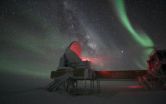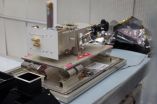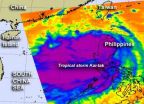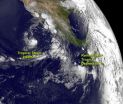(Press-News.org) CORAL GABLES, FL (August, 15, 2012)--University of Miami scientists have developed a way to switch fluorescent molecules on and off within aqueous environments, by strategically trapping the molecules inside water-soluble particles and controlling them with ultraviolet light. The new system can be used to develop better fluorescent probes for biomedical research.
Previous studies have used water-soluble particles to bring organic molecules into water. What is novel about this system is the use of a photoswitching mechanism in combination with these particles.
The findings published online by Chemistry-A European Journal, describe the creation of a fluorescent photoswitchable system that is more efficient than current technologies, says Francisco Raymo, professor of chemistry at the UM College of Arts and Sciences and principal investigator of this study.
"Finding a way to switch fluorescence inside cells is one of the main challenges in the development of fluorescent probes for bioimaging applications," Raymo says. "Our fluorescent switches can be operated in water efficiently, offering the opportunity to image biological samples with resolution at the nanometer level."
Fluorescent molecules are not water soluble; therefore Raymo and his team created their system by embedding fluorescent molecules in synthetic water-soluble nanoparticles called polymers that serve as transport vehicles into living cells. Once inside the cell, the fluorescence of the molecules trapped within the nanoparticles can be turned on and off under optical control.
"The polymers can preserve the properties of the fluorescent molecules and at the same time assist the transfer of the molecules into water," Raymo says. "It's a bit like having a fish in a bowl, so the fish can carry on with its activities in the bowl and the whole bowl can be transferred into a different environment."
The new system is faster and more stable than current methods. The fluorescent molecules glow when exposed simultaneously to ultraviolet and visible light and revert back to their original non-luminous state in less than 10 microseconds after the ultraviolet light is removed.
By using engineered synthetic molecules, the new system is able to overcome the natural wear down process that organic molecules are subject to when exposed to ultraviolet light.
"The system can be switched back and forth between the fluorescent and non-fluorescent states for hundreds of cycles, without sign of degradation," Raymo says.
The surface of the system can be customize to help it attach to specific molecules of interests, thus allowing researchers to visualize structures and activity within cells, in real time, with a resolution that would otherwise be impossible to achieve.
INFORMATION:
Raymo and his team will continue improving the properties of the molecules for future biomedical applications. The study is titled "Fast Fluorescence Switching within Hydrophilic Supramolecular Assemblies" Co-authors are Janet Cusido, Mutlu Battal, Erhan Deniz and Ibrahim Yildiz,Ph.D., students in the Department of Chemistry at UM; and Salvatore Sortino, associate professor of chemistry in the Department of Drug Sciences, University of Catania, Italy. The research was supported by the National Science Foundation.
The University of Miami's mission is to educate and nurture students, to create knowledge, and to provide service to our community and beyond. Committed to excellence and proud of the diversity of our University family, we strive to develop future leaders of our nation and the world. www.miami.edu
Designing tiny molecules that glow in water to shed light on biological processes
University of Miami researchers are creating fluorescent molecules that can be turned on and off in aqueous environments to visualize activity within cells
2012-08-16
ELSE PRESS RELEASES FROM THIS DATE:
NSF's South Pole Telescope discovers a galaxy cluster creating stars at a record pace
2012-08-16
A National Science Foundation-funded radio telescope in Antarctica has found an extraordinary galaxy cluster that may force astronomers to rethink how galaxy clusters and the galaxies that inhabit them evolve.
The galaxy cluster was discovered some 5.7 billion light years from Earth by the 10-meter wide South Pole Telescope (SPT) located at NSF's Amundsen-Scott South Pole Station in Antarctica, which is funded by NSF's Office of Polar Programs.
NSF manages the U.S. Antarctic Program, through which it coordinates all U.S research and required logistical support on the ...
Lunar reconnaissance orbiter spectrometer detects helium in moon's atmosphere
2012-08-16
Scientists using the Lyman Alpha Mapping Project (LAMP) spectrometer aboard NASA's Lunar Reconnaissance Orbiter (LRO) have made the first spectroscopic observations of the noble gas helium in the tenuous atmosphere surrounding the Moon.
These remote-sensing observations complement in situ measurements taken in 1972 by the Lunar Atmosphere Composition Experiment (LACE) deployed by Apollo 17.
Although designed to map the lunar surface, the LAMP team expanded its science investigation to examine the far ultraviolet emissions visible in the tenuous atmosphere above the ...
NASA sees large Tropical Storm Kai-tak headed for a landfall near Hong Kong
2012-08-16
Warnings are still in effect in the northern Philippines and now in Hong Kong, as Tropical Storm Kai-tak continues to drop heavy rainfall and move toward a landfall in China. NASA's Aqua satellite captured infrared data that shows a large area of strong thunderstorms that make up Kai-tak.
NASA's Aqua satellite captured infrared data on Kai-tak when it passed overhead on August 15 at 0517 UTC (1:17 a.m. EDT/1:17 p.m. local time, Hong Kong). Forecasters at the Joint Typhoon Warning Center noted that infrared satellite imagery shows the organization near the center of Kai-tak's ...
Lunar Reconnaissance Orbiter's LAMP spectrometer detects helium in moon's atmosphere
2012-08-16
Scientists using the Lyman Alpha Mapping Project (LAMP) aboard NASA's Lunar Reconnaissance Orbiter have made the first spectroscopic observations of the noble gas helium in the tenuous atmosphere surrounding the Moon. These remote-sensing observations complement in-situ measurements taken in 1972 by the Lunar Atmosphere Composition Experiment (LACE) deployed by Apollo 17.
Although LAMP was designed to map the lunar surface, the team expanded its science investigation to examine the far ultraviolet emissions visible in the tenuous atmosphere above the lunar surface, detecting ...
GOES-15 satellite sees fading Tropical Storm Hector and TD7's remnants
2012-08-16
Two tropical cyclones were spotted from NOAA's GOES-15 satellite today, August 15. Tropical Storm Hector continues to weaken in the Eastern Pacific Ocean, while the remnants of the Atlantic Ocean's Tropical Depression 7 are moving over Central America. NASA's GOES Project, located at NASA's Goddard Space Flight Center, Greenbelt, Md., uses the GOES-15 satellite data to create images and animations from the satellite. The NOAA GOES-15 satellite sits in a fixed orbit over the eastern U.S. and provides infrared and visible imagery of the Eastern Pacific Ocean basin continuously. ...
Continuous oral contraceptive pills offer women earlier pain relief
2012-08-16
Taking oral contraceptives continuously, rather than as traditionally prescribed for each cycle, provides earlier relief for moderate to severe menstrual cramps -- dysmenorrhea -- according to researchers at Penn State College of Medicine.
Dysmenorrhea occurs during menstruation, resulting from abnormal uterine contractions, increased sensitivity to pain and added pressure in the pelvic area. It is often accompanied by nausea, vomiting, diarrhea, headache and fatigue.
"Between 50 and 90 percent of women suffer from this condition, and it can really limit work, school, ...
Astronomers reassured by record-breaking star formation in huge galaxy cluster
2012-08-16
This press release is available in Spanish.
Until now, evidence for what astronomers suspect happens at the cores of the largest galaxy clusters has been uncomfortably scarce. Theory predicts that cooling flows of gas should sink toward the cluster's center, sparking extreme star formation there, but so far – nada, zilch, not-so-much.
The situation changed dramatically when a large international team of over 80 astronomers, led by Massachusetts Institute of Technology's Hubble Fellow Michael McDonald, studied a recently discovered (yet among the largest-known) galaxy ...
Divorced couples' co-parenting relationships can improve, MU researcher says
2012-08-16
COLUMBIA, Mo. – New research conducted at the University of Missouri offers hope for divorced parents and suggests hostile relationships can improve when ex-spouses set aside their differences and focus on their children's needs.
"Most people falsely believe that, when people get divorced, they'll continue to fight, to be hostile," said Marilyn Coleman, Curators' Professor of Human Development and Family Studies at MU. "We found in our study that's not always true. Some couples get along from the very beginning, and, for about half of the women we interviewed, the couples ...
Tracking the effects of prenatal alcohol exposure through to 9 years of age
2012-08-16
Although studies of alcohol's effects on fetal growth have consistently demonstrated deficits that persist through infancy, the data on long-term postnatal growth from human studies have been inconsistent. A new study of the effects of heavy prenatal alcohol exposure (PAE) on growth and body composition throughout childhood has found growth restrictions that persist through to nine years of age, as well as a delay in weight gain during infancy, both of which were exacerbated by iron deficiency.
Results will be published in the November 2012 issue of Alcoholism: Clinical ...
Climate change effects, potential mitigation in Northeast forests subject of Forest Service Report
2012-08-16
DURHAM, N.H., August 15, 2012 – A new report by U.S. and Canadian scientists analyzes decades of research and concludes that the climate of the Northeast has changed and is likely to change more. The report outlines the effects of climate change on multiple aspects of forests in the northeastern corner of the United States and eastern Canada and concludes with recommendations on adaptive and mitigating strategies for dealing with future effects.
The report, "Changing Climate, Changing Forests: The impacts of climate change on forests of the northeastern United States and ...
LAST 30 PRESS RELEASES:
Fecal transplants from older mice significantly improve ovarian function and fertility in younger mice
Delight for diastereomer production: A novel strategy for organic chemistry
Permafrost is key to carbon storage. That makes northern wildfires even more dangerous
Hairdressers could be a secret weapon in tackling climate change, new research finds
Genetic risk for mental illness is far less disorder-specific than clinicians have assumed, massive Swedish study reveals
A therapeutic target that would curb the spread of coronaviruses has been identified
Modern twist on wildfire management methods found also to have a bonus feature that protects water supplies
AI enables defect-aware prediction of metal 3D-printed part quality
Miniscule fossil discovery reveals fresh clues into the evolution of the earliest-known relative of all primates
World Water Day 2026: Applied Microbiology International to hold Gender Equality and Water webinar
The unprecedented transformation in energy: The Third Energy Revolution toward carbon neutrality
Building on the far side: AI analysis suggests sturdier foundation for future lunar bases
Far-field superresolution imaging via k-space superoscillation
10 Years, 70% shift: Wastewater upgrades quietly transform river microbiomes
Why does chronic back pain make everyday sounds feel harsher? Brain imaging study points to a treatable cause
Video messaging effectiveness depends on quality of streaming experience, research shows
Introducing the “bloom” cycle, or why plants are not stupid
The Lancet Oncology: Breast cancer remains the most common cancer among women worldwide, with annual cases expected to reach over 3.5 million by 2050
Improve education and transitional support for autistic people to prevent death by suicide, say experts
GLP-1 drugs like Ozempic could cut risk of major heart complications after heart attack, study finds
Study finds Earth may have twice as many vertebrate species as previously thought
NYU Langone orthopedic surgeons present latest clinical findings and research at AAOS 2026
New journal highlights how artificial intelligence can help solve global environmental crises
Study identifies three diverging global AI pathways shaping the future of technology and governance
Machine learning advances non targeted detection of environmental pollutants
ACP advises all adults 75 or older get a protein subunit RSV vaccine
New study finds earliest evidence of big land predators hunting plant-eaters
Newer groundwater associated with higher risk of Parkinson’s disease
New study identifies growth hormone receptor as possible target to improve lung cancer treatment
Routine helps children adjust to school, but harsh parenting may undo benefits
[Press-News.org] Designing tiny molecules that glow in water to shed light on biological processesUniversity of Miami researchers are creating fluorescent molecules that can be turned on and off in aqueous environments to visualize activity within cells





